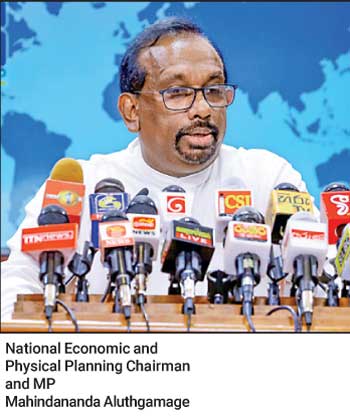Wednesday Feb 25, 2026
Wednesday Feb 25, 2026
Saturday, 19 August 2023 01:04 - - {{hitsCtrl.values.hits}}
 The Sectoral Oversight Committee on National Economic and Physical Planning Chairman and MP Mahindananda Aluthgamage revealed crucial measures rolled out by Government to fortify fiscal stability and streamline revenue collection by enhancing the tax mechanism.
The Sectoral Oversight Committee on National Economic and Physical Planning Chairman and MP Mahindananda Aluthgamage revealed crucial measures rolled out by Government to fortify fiscal stability and streamline revenue collection by enhancing the tax mechanism.
Recognising the need for robust action, he emphasised that the new Inland Revenue Ordinance will empower formidable measures to address underperformance within the Inland Revenue Department (IRD). He highlighted that the objective is to make decisive decisions regarding officials not effectively contributing to boost Government tax revenue.
“The gravity of the situation necessitates swift, comprehensive reforms to address complexities within the current tax collection framework,” Aluthgamage told journalists at the Presidential Media Centre (PMC) on Thursday.
Underscoring the pivotal role of the three key State institutions — Inland Revenue Department, Customs, and Excise Department in revenue generation, he stressed the anticipated collective Government tax revenue target of Rs. 3,105 billion for 2023 contrasts with the actual collection of Rs. 1,179 billion from these institutions so far.
“Global standards indicate Government revenue at around 20% of GDP, while Sri Lanka’s stands at 8.20% in 2023. With only 500,000 personal tax files among a population of 22 million, there’s a pressing need to bridge the considerable revenue gap. Corporate tax contribution is also low, with only 15,000 out of 105,000 companies fulfilling their tax obligations,” he pointed out.
Aluthgamage claimed the Inland Revenue Department, tasked with collecting Rs. 904 billion in taxes, faces challenges. “Sri Lanka stands as the only nation worldwide allowing four appeals without fulfilling tax obligations, leading to a 15-year period for scrutiny,” he added.
“To address these issues, he said collaboration with the Justice Ministry aims to promptly amend the Inland Revenue Act. “Proposals to reduce allowable appeals from four to two are being considered, aiming to streamline the tax collection process. Efforts to accumulate the substantial tax sum of Rs. 904 billion are gaining momentum,” he added.
He said the urgency of systemic change underscores the paramount importance of amendments to the Customs and Excise Department Ordinances.
“These changes are pivotal in modernising and optimising revenue collection processes. The country’s development, subsidies and Government operations depend heavily on tax revenue. Therefore, tackling these challenges is crucial for Sri Lanka’s sustainable growth,” Aluthgamage emphasised.
Noting that the digital Revenue Administration Management Information System (RAMIS) remains unimplemented despite significant investment, he said its deployment could enhance transparency and fairness.
Aluthgamage said a determined effort towards tax reform, legislative changes, and the adoption of digital systems reflects a resolute commitment to enhancing Sri Lanka’s tax collection efficiency and fiscal transparency.
He pointed out that the pressing need for a robust tax collection system is underscored by the fact that there are currently 16 Inland Revenue Department offices, with the Colombo district alone necessitating 15 such offices.
“This numerical absurdity illustrates a potential hurdle to achieving tax revenue targets. To overcome this challenge, a comprehensive approach that takes into account all relevant factors is indispensable,” he added.